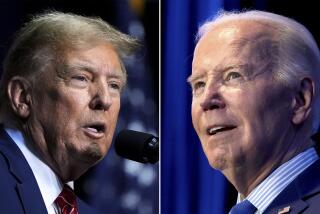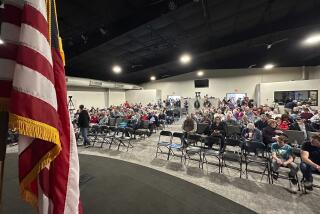Dukakis, Bush Win in Maine; Jackson Second
PORTLAND, Me. — Gov. Michael S. Dukakis of Massachusetts and Vice President George Bush won expected victories in Maine’s presidential caucuses Sunday, but Dukakis’ Democratic triumph was shared by the Rev. Jesse Jackson, who demonstrated an ability to attract widespread support among white voters.
Dukakis and Bush profited from their victories in New Hampshire two weeks ago, as their principal rivals virtually ceded the race to them, allowing Dukakis and Bush to use their extensive organizations and regional ties to consolidate their hold on their native New England.
Filled the Void
Jackson, who finished with 27% of the state’s Democratic delegates to 46% for Dukakis, took advantage of the void, launching a last-minute television advertising campaign to help broaden the support he had already received from the state’s union leaders and workers.
Other totals, with 81% of the state’s precincts reporting, were: Illinois Sen. Paul Simon, 4%; Missouri Rep. Richard A. Gephardt, 3%, Tennessee Sen. Albert Gore Jr., 1%, and former Colorado Sen. Gary Hart, 1%, with 18% uncommitted.
On the Republican side, Bush outpolled Pat Robertson 65% to 14%, successfully facing down what was viewed as a serious threat because of the Robertson campaign’s ability to drum up grass-roots support, which he had used to great advantage in previous caucus states.
The GOP figures were provided by the Bush campaign, and were not contested by other candidates. Because some scattered caucuses have not yet been held, the state party has not released official figures. Other unofficial figures were Kansas Sen. Bob Dole, 8%, and New York Rep. Jack Kemp, 1.5%, with 12% uncommitted.
While both Jackson and Robertson showed strength in unfamiliar territory, their support appeared too scant to translate into significant blocs of delegates to the national conventions. Those delegates will be elected at state conventions later this spring.
Rival Republican campaigns conceded that Bush would almost certainly win all 22 of Maine’s delegates to the Republican convention. While Dukakis’ narrower margin of victory and complicated Democratic Party rules make his delegate count more difficult to predict, party leaders here said he is likely to win at least 20 of the state’s 27 Democratic national delegates if he continues to run strongly elsewhere in the country.
The influence of delegates elected from Maine is likely to be scant, as their numbers represent less than 1% of the delegates to the Democratic National Convention and barely 1% of Republican delegates.
Efforts Reduced
Because of the Bush and Dukakis victories in New Hampshire Feb. 16, several candidates drastically reduced their efforts in Maine in order to focus their attention elsewhere. The Dole campaign reduced its staff from 13 to 2, while Gephardt and Simon canceled planned commercials.
Aides to the victorious Dukakis and Bush campaigns hailed the Maine result as important evidence that other candidates are not pursuing a national strategy.
“No one was responding to Gephardt’s message in Maine, no one at all,” said Tad Devine, Dukakis’ national political director. “In the places he hasn’t saturated the media, we’ve seen nothing. Ours is a national campaign.”
Ron Kaufman, Bush’s campaign coordinator in the Northeast, said Bush’s victory showed that support for Dole in the region had crumbled significantly since New Hampshire and said he believed it was crumbling in the South as well.
With Gephardt and Dole essentially out of the Maine race before the caucuses began, and the attention of even the acknowledged front-runners focused on the March 8 Super Tuesday races, the contest between candidates in Maine was for the most part fought by surrogates, with few signs of animosity.
Uncommitted slates finished strongly in both races, reflecting the long delay between the caucuses and the state conventions and also what state Democratic Party leaders said was a disaffection with the slate of candidates.
Jackson won his strong success with a message that rarely mentioned his rivals and appealed heavily to disaffected workers by focusing on a long-running battle between unions and management at the International Paper Co. in the town of Jay. Jackson was endorsed by nearly all of the state’s labor leaders.
Scott Nova, a spokesman for the Jackson campaign, said his second-place finish in Maine, where there are few minority voters, would “send a very strong message to the nation that Jesse Jackson is being supported not because he’s black but because people like what he’s saying.”
One Bitter Battle
Only the Republican battle between Bush and Robertson turned bitter here, as supporters of Bush and Dole formed coalitions to deprive the former religious broadcaster of delegates in some caucuses, inspiring cries of protest from Robertson supporters.
The Robertson campaign charged that the “Beat Robertson” tactics were formally orchestrated by the Bush and Dole campaigns, and spokesman Jeff Nelson contended Sunday night that the coalition prevented Robertson from winning “a majority of state delegates and victory in Maine.
“While George Bush may have won Maine in terms of state delegates here,” Nelson said, “I don’t think he’s won it on his own merit.”
But Bush and Dole aides said that while the campaigns had discussed the prospect of a coalition strategy, the coalitions had been formed at the local level by Republican Party regulars who feared the influence of sending Robertson supporters to the state convention.
State Sen. Pamela Cahill, Dole’s state coordinator, said that Dole’s national strategists had suggested that Dole and Robertson supporters form a “Beat Bush” coalition to embarrass the vice president, but that Maine Republicans had not been willing to go along with it.
Bush aides said that their candidate had benefited from a “slingshot effect” out of Maine but emphasized an anti-Robertson tilt, declaring that the wide margin of victory was necessary to deprive Robertson national benefit from the Maine race.
“This isn’t tiddlywinks,” said Gov. John R. McKernan Jr., Bush’s top supporter in the state. “We are talking about the next President of the United States. All eyes were focused toward Maine, and we couldn’t afford to have the national story out of Maine be that Robertson comes close second.
“This is important from a defensive standpoint, not offensive.” McKernan said.
More to Read
Get the L.A. Times Politics newsletter
Deeply reported insights into legislation, politics and policy from Sacramento, Washington and beyond. In your inbox three times per week.
You may occasionally receive promotional content from the Los Angeles Times.










